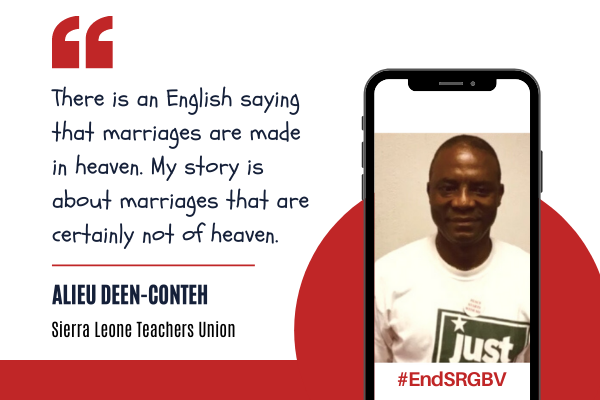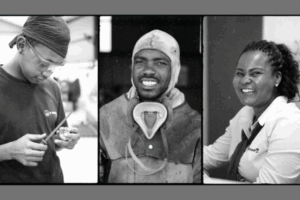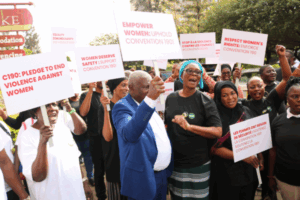In September 2019, 19 trade union activists and four Gender at Work facilitators (including two LRS staff members) involved in The Education Unions Take Action to end School-Related Gender-Based Violence (SRGBV) initiative in sub-Saharan Africa participated in a creative writing process to produce 23 inspirational stories narrating their journey in the work of addressing social norms that perpetuate gender-based violence in schools. The SRGBV initiative is part of a decades-long quest by global teachers’ union Education International (EI) and UN Girls’ Education Initiative (UNGEI) to advocate for the advancement of gender equality in the education sector and in trade unions.
Alieu Deen-Conteh (pictured) is Assistant Secretary-General of Sierra Leone Teachers Union (SLTU).
I was born into a polygamous family with many brothers and sisters. You could easily spot out the bright potential in my youngest sister, Mbalu. She was a very beautiful girl who many described as the princess of our village – Mafaray. On top of her beauty, she was also intelligent. Mbalu was 16
and in senior secondary school and, according to her teachers, she was doing extremely well in class. Because of her beauty and brilliance, she became the focus of attraction to all.
One fateful afternoon, Mbalu was sitting in the veranda reading her books, when she saw an elderly man, old as our father, approaching the house. Little did she know that this man had come to see our father on some sinister mission. Both men laughed heartily at the door as my father bade him farewell. A few days later, father explained things to Mbalu. “Come sit near me, my princess. I want to talk to you,” father said, “You know that we are poor and I am getting old and can die at any time.”
“Yes Papa, I know this very well. That is why I want to be educated so that I can take care of you and Mama,” Mbalu replied.
Mbalu did not know that there was more to it. Father broke the news that the old man who was at our house was asking for her hand in marriage. The little girl was shocked at her father’s callousness. She insisted that she would not marry the old man as she was still in school. Tears of anger and frustration streamed down her face. Father tried to convince other members of the family with the notion that with all their education, women still had to get married. So why not do it now as schools are meant for boys; not girls? Our father was one of those who believed that women in the city, who became too educated, ended up not getting married. He did not want his daughter to end up like that. He said any woman who was not married was like a house which was beautifully built but had no roof.
The next thing father did was to withdraw our sister from school. That news was devastating for all of us including our mother who always kept her silence and never wanted to offend her husband. Father would beat up my mother each time she tried to put up a case against his excesses. My heart was bleeding living under the dominion of such terror! My lovely sister, the village princess, who desired her freedom to go back to school, eventually accepted to marry Pa Amadu. This was to please her father, even if momentarily.
After getting married, Mbalu became the third wife and suffered two miscarriages that almost cost her life. She, however, contemplated a Plan B to deal with the situation of her marital home. With the support of some sensitive neighbours, she succeeded in running away to freedom in the capital city of Freetown. She was able to get back to school and finish university. This childhood experience of mine has had an indelible impact on my life as an SRGBV activist and change team member of my union.
My mother’s words of counsel that remain with me to this day are that I should not hate my father nor anybody else. I should love all people and care for those who are in pain. I think this is important in our work with SRGBV in trying to give a voice to the voiceless. The story of Mbalu’s early marriage and other forms of domestic abuse and violence are common in our communities. Domestic abuse destroys the destinies of many. However, a lot of these cases remain unreported mainly because of the culture of silence in society. This culture of silence is very common in African Societies. Compromises are reached among family members when these acts are committed. The focus is on keeping good relationships and preserving the good name of the family.
The victims carry the stigma and are sometimes also made to feel that they have done something wrong. They feel the pain twice.
My experience as a change team member has also taught me that there is a culture of silence at the trade union level, in the union offices, among the executive and with classroom teachers who are sometimes perpetrators.
Teachers often abuse children in various forms but we do not always see what action is taken against such members. How many voices do we hear from the union condemning such acts? Our Profession is degraded in the public eye because they do not hear much from the union about what we are doing with members who are perpetrators.
As the Editor of our union’s magazine and also as a trainer in almost all of our programmes, I have some leverage and the opportunity to fight against SRGBV. But as they say, charity begins at home and the fight has to start with our own house, the union, and roll out into the wider community. As a whistle-blower, one must be prepared for the consequences in this noble fight. SRGBV might fight back!
Together with Government, our union is currently reviewing the teachers’ Code of Conduct to include in it contemporary emerging issues, including SRGBV. Our union’s Gender Policy is also being looked into.
During my training especially in the regions, I came to realise that many practices like corporal punishment, domestic violence, female genital mutilation, child marriage and teenage pregnancy are considered normal because of our culture and tradition. The fact that teachers, who are educated, sometimes hold fast to these negative cultural practices, poses a challenge. However, to my mind it also provides an opportunity for change teams to engage these teachers with the facts and figures on the harmful effects of these practices, not only on individuals, but on the society at large.
Our teachers are encouraged to contribute stories to the union magazine. The SRGBV column helps to bring issues into sharp focus. The stories help us recognise that our own experiences are not necessarily unique. They help us understand that we are not alone as we navigate this journey called life. Stories are also important because every one of us is looking for answers and we connect with appropriate and authentic stories that help us build bonds and bridges to overcome life’s challenges.
Our union’s training programmes have not only targeted the union leaders but also the rank and file members, especially women, through the women’s committee structures across the country. These groups of union leaders and teachers are reaching out to school children, especially girls, their teacher colleagues and the wider community. The School Management Committees (SMCs), Boards Of Governors (BOGs) and the Parents/Community Teachers Associations (PTAs/CTAs) have all been part of this continued engagement in the crusade against SRGBV in our country. I am currently serving on a joint committee set up by the government to examine the existing legislation around gender-based violence and child abuse.
There are problems with weak or incoherent laws and the ineffective enforcement of the laws. For instance, there is one law which says customarily it is lawful for a girl under 18 to get married as long as the parents give their consent. Another more recent law says that no girl under 18 shall get married. This new law does not make any reference to the previous customary law. The inconsistencies in the laws pose a challenge in the fight against SRGBV. Through our advocacy, the Sexual Offences Act of 2012 is under drastic review by parliament to include life imprisonment for cases of sexual penetration against children (under 18). The previous sentence was 15 years in jail.
I appreciate the work of other members of our change team who are engaged in SRGBV prevention. This includes School Drama Clubs, community sensitisation and networking with other stakeholders including religious leaders like pastors and imams. The fight has to be concerted and taken from all fronts as no one solution fits all. One approach or strategy can never be enough. We need all hands on deck. It is crucial that in all of this, we the men should take the frontline as champions in the struggle. The fact that our country’s President, Dr Julius Maada Bio, declared a national state of emergency on rape and other forms of sexual violence underscores the seriousness of our situation. What about the first lady’s campaign called “Hands off Our Girls”, which is an initiative of the first ladies of the West African sub-region? Are these all not a wake-up call for SRGBV activists to network?
Each time I think of my sister’s escape from a forced and abusive marriage, I feel very, very sorry. It reminds me of the many others in similar situations. It gives inspiration to continue the good fight against all forms of gender-based violence. Our action plan is to keep decreasing the menace until we reach our ultimate goal of creating a zero percent situation where there is no more weeping and wailing. We have to help save destinies around the globe.
Aluta Continua!
Our collection of stories told by representatives of education trade unions in Africa bring to life the pain and suffering resulting from school-related gender-based violence, but also the power of teachers as agents of change in ending the scourge.
Know more: Working with teacher unions to end school-related gender-based violence






